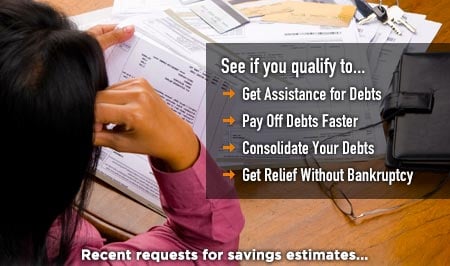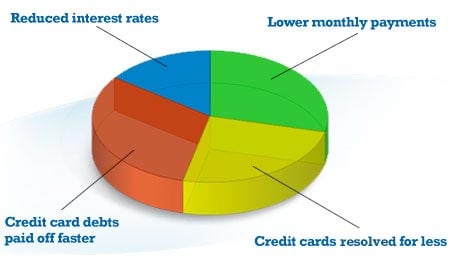
Debt Relief FAQ
Talk about debt relief, credit counseling, debt-reduction and debt-relief these days or any kind of debt related topic - and most consumers simply want the facts, commonly known to web surfers as the FAQ. Many consumers are not only uncertain about the options available to them, but unsure of how these debt relief options may or may not apply to their situation.
As the nation tumbles deeper in a sluggish economy filled with cutbacks, layoffs, and higher unemployment, it stands to reason that there will continue to be a high demand for debt relief information and services. Consumers are seeking various kinds of debt solutions - from credit counseling to debt reduction, from credit repair to debt settlement.
See how debt relief can help you. Answer a few, simple questions to get a free debt relief estimate and savings analysis - at no cost to you.
For many consumers, it's the need to get a handle on out-of-control debt; for others it's how to get credit card companies to lower interest rates and lessen pressure from creditors calling; still others may want to "settle" credit card debt for less than is owed in an attempt to get an agreement in place with credit card companies whereby they can "settle for less than the full amount owed." Finally, consumers are struggling to understand how they can cope with the financial realities they face without having to resort to using credit -- and this is especially the case with utilizing revolving credit to purchase necessities in life like food, clothing, or medicine. In this case, it is a sign of the times that good, well-meaning, people do get into debt and the situation is often one, not of reckless spending, but of the need to survive.
For people in Florida, as well as nationwide, here are some common questions regarding debt relief:
Top FAQ's
1. How do I know if I might qualify for debt relief? One or more of the following may apply:
- You are behind on bills, in danger of falling behind or simply paying monthly minimums and doing little or nothing to pay down your principal amount of debt.
- You have burdensome unsecured debt, such as credit cards, store charge cards, gas cards, medical bills, doctor bills (does not include secured debt such as a home or car)
- You are finding that you are often using revolving credit cards to pay for the basic essentials in life such as food and medicine
- You have multiple unsecured debts, or many revolving credit cards and feel the need to acquire more cards in order to have more available credit
- You have some income, but need to lower your monthly payments to meet your debt obligations
2. What types of debt typically qualifies for debt relief?
UNSECURED DEBT, including: credit cards, gas cards, signature (unsecured) loans, doctor, hospital and medical, subscriptions, utilities, memberships, cell phones, etc.
3. What types of debt DO NOT qualify?
SECURED DEBT, including: recreation vehicles and boat loans, auto loans, government-guaranteed student loans, home mortgages.
4. Will my information remain confidential?
Work ONLY with a reliable debt-relief company committed to maintaining the privacy and confidentiality of your personal financial information
5. How long will it take to become debt-free and how much could I save?
The time it takes to become debt-free will vary from individual to individual and it is vital to understand that the success of any debt relief program is dependent upon the diligence of the consumer to either pay down debts month after month and commit to NOT taking on additional debt, OR it requires the consumers to set aside money each month that can later be used to make a "settlement offer" requesting a settlement for less than the full amount owed. While many debt consolidation or debt management programs provide the guideline for becoming debt free in as little as 3-5 years and settlement programs often promote settlements in as little as 2-3 years, these are just general guidelines and may not apply at all to your situation. How quickly you can pay down debt and become debt free depends on your decision NOT to take on additional debt. In addition, how quickly you are able to reduce or retire your existing debt has much to do with how much debt you currently have, the type of debt you have, the debt relief policies of the companies involved AND, very importantly, how much money you have each month to apply towards retiring your debt. You see, debt relief can greatly help to remove stress over debts, and it can save a substantial amount of money, but debt relief does not make debts magically go away.
Explore your debt relief options. Request a free debt relief estimate and savings analysis, at no obligation to you.
What debt relief does is provide a program, a structure, a debt relief plan that you can utilize to regain control of your finances. Regarding time to settle debts, In the case of debt settlement, if you are able to set aside a settlement fund in much less time, then you could begin to settle card accounts fairly quickly. Considering the fact that when you fall behind by even 90 days or so, many creditors may decide to sell off debt for as little as ten cents on the dollar -- these same creditors may be quite willing to accept far less than you currently owe if you are able to accumulate a reasonable amount of money to extend a settlement offer.
6) Can I continue using my credit cards?
No, when working with a debt relief company, it is strongly recommended you not use credit cards. Using credit cards - while in a debt-relief structured program - can hamper an individual's ability to meet the agreed-upon interest rates and monthly payback amounts negotiated by the debt-relief company. It is never a good idea to try to get out of debt while you are piling on still more debt. Do everything you can to commit to a debt-free life from the very beginning of your debt relief program. Please know that many people in a debt relief program do not succeed, and one of the main reasons is that they continue to accumulate new debt that only makes matters worse -- and often they do not even have enough money in their account to make monthly debt management or debt settlement set-aside payments.
7. Will my credit be affected?
This is important to understand: Let's be clear: Generally debt relief programs are considered to be a negative for credit. That having been said. If your credit is already fair or average, paying down the principal amount of your debt at an accelerated pace could very well help to improve your credit standing. This is the situation one would hope for with a credit counseling or debt management program. With debt settlement, while you stop paying credit card accounts in order to accumulate money to use as a set-aside lump-sum settlement, your credit score will likely suffer, and you could even face legal action for defaulting on the terms of your cardholder agreement. So, the bottom line, debt-relief is certainly not credit repair. However, even debt settlement which can hurt credit, does not have as long-lasting and severe an impact on credit as personal bankruptcy, which can remain on a credit report for ten years and make it hard to secure new credit -- especially at favorable terms. The bottom line on debt relief and credit standing: Generally debt relief will likely have a negative affect on credit, but as debts are paid off or settled and credit obligations are met successfully in the future, credit may very well improve and, often, much faster than people imagine because two main factors affecting credit scores are: most recent payment history, as well as debt-to-credit-limit ratios.
8. Can I be sued for my defaults during a debt-settlement period?
The answer is YES, you can be sued. While a lawsuit for unpaid balances can occur in Florida and other states around the nation, many creditors realize that a settlement may be preferable to "selling off" bad debt to a third-party collection agency for as little as ten cents on the dollar. Thus, even though threats to sue may be made, often a credit card company may agree in time to accept a reasonable lump sum settlement offer. Federal law now requires that debt settlement companies inform potential clients that there is the possibility that they can get sued. This is a truthful and responsible disclosure and the legal obligation on the part of the debt settlement company, but the fact is, while lawsuits for unsecured credit card debt can occur, it is also quite possible that, in time, a creditor will be more than willing to consider a fair and reasonable offer to settle the debt for less than the full amount owed.
9. Are there upfront fees?
Recent federal legislation prevents the charging of upfront fees for debt settlement. Under the new rule, debt-settlement companies are required to present to the debtor, agreements from all creditors for specific amounts of debt reduced along with time-required plus cost to reduce the debt. Once a client settles withe the creditor and savings are realized, the debt-settlement company is allowed to charge and collect. Fees, according to the new FTC rules, should be commensurate with the services rendered. In the case of debt settlement that is conducted by an "attorney-based" debt relief firm, upfront fees may be charged only if there was a face-to-face meeting upon engagement with the lawyer or attorney handling the debt relief matter.
10. How about the benefits of debt-consolidation?
- The benefit of debt consolidation through a debt management plan coordinated by a credit counseling company is the combining, or consolidating, of unsecured higher-interest rates debts - into a single, lower interest rate, easier to manage payment each month that can allow the consumer to accelerate the process of debt reduction and provide a proven plan out of debts that is, if followed faithfully, predictable.
- The bottom line: Debt relief services can help consumer gain control of debts, reduce debts, lower levels of stress, and save money, but, in truth, they only provide the framework or "gameplan" by which individuals or families can get off the debt treadmill on the path to become debt free. The success of any program requires effort and discipline on the part of the consumer to either ensure that enough money is available each month to make the payments as agreed towards a debt management plan or to set aside funds that can be used for a successful settlement offer to a credit card company. If the above is achieve, and new debt is not taken on, your chances of success through a debt relief program are greatly increased. People can and do save money through debt relief and many do get on track financially -- but many more will not succeed because they are not able, or lack the discipline, to stick to the program.
Request a free debt relief analysis and savings estimate in minutes. Start by answering a few, simple questions here.























